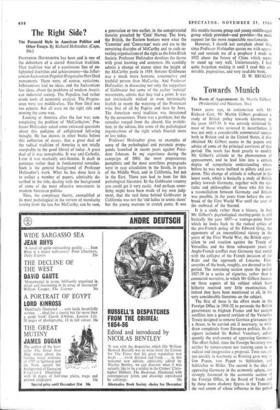The Right Side?
PROFESSOR HOFSTADTER has been and is one of the debunkers of a sacred American tradition. That tradition was of a continuous line of en- lightened doctrines and achievements—the Jeffer- sonian-Jacksonian-Populist-Progressive-New Deal movements. There were, of course, variations. Jeffersonians had no ideas, and the JaCksonians few ideas, about the problems of modern Ameri- can industrial society. The Populists had rather crude tools of economic analysis. The Progres- sives were too middle-class. The New Deal was too eclectic. But all were on the right side and moving the same way.
Looking at America after the last war, con- templating the problem of `McCarthyism,' Pro- fessor Hofstadter asked some awkward questions about this pedigree of enlightened left-wing thought. He has shown, in other books before this collection of essays, that a great deal of the radical tradition of America is not totally acceptable to the good liberal of today. A great deal of it was xenophobic. It was anti-Catholic. Later it was markedly anti-Semitic. It dealt in panaceas rather than in fundamental remedies. Such is the general background of Professor Hofstadter's work. What he has done here is to collect a number of papers, admirably de- scribed in the title, dealing with the background of some of the most offensive movements in modern American politics.
Thus, the conspiracy theory, exemplified at its most pathological in the torrent of mendacity issuing from the late Joe McCarthy, can be seen,
a generation or two earlier, in the conspiratorial theories preached by 'Coin' Harvey. The Jews, the British, the Eastern bankers were what the `Commies' and 'Comsymps' were and are to the remaining disciples of McCarthy and to such re- vealing organisations of the right as the John Birch Society. Professor Hofstadter develops the theme with great learning and acuteness. He candidly admits a change of stance since the height of the McCarthy panic in 1954. Senator Goldwater was a much more humane, constructive and truthful person than McCarthy. And Professor Hofstadter, in discussing not only the supporters of Goldwater but some of the earlier 'nativist' movements, admits that they had a point. It was not intrinsically wicked or even intrinsically foolish to resent the watering of the Protestant wine first of all by Papists and then by Jews. The American rural tradition was threatened by the newcomers. There was a problem; but the remedies ranged from the absurd, like prohibi- tion, to the odious, like some of the pathological organisations of the right which flourish more or less today.
Professor Hofstadter gives us examples of some of the pathological and paranoic propa- ganda launched in recent years against Presi- dent Johnson. In my experience during the campaign of 1964, the most preposterous pamphlets and the most scurrilous propaganda were in easy circulation in the South, in parts of the Middle West, and in California, but not in the East. There you had to hunt for this pathological literature. In the Goldwater country you could get it very easily. And perhaps some- thing might have been made of my own judg- ment, that the real force behind Goldwater in California was not the 'old ladies in tennis shoes' but the young matrons in stretch pants. It was this middle-income group and young middle-aged group which provided—and provides—the main support for the more respectable reactionaries.
However, I should not complain about this, since Professor Hofstadter quotes me with appro- val and reminds me of a prophecy I made in 1952 about the future of China which seems to stand up very well. Unfortunately, I had quite forgotten making it until I read this ad- mirable, pugnacious, and very readable book.
D. W. BROGAN














































 Previous page
Previous page